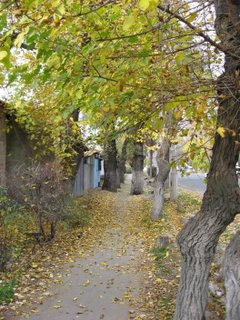
November 19, 2006
I spent the majority of this beautiful fall day indoors, taking advantage of a free day to catch up on some reading, writing and resting. In the late afternoon, I went to a Lebanese restaurant to pick up some take-out, then stopped by the supermarket. On my way out, I saw a man curled up along the side of the road. His head lay face down on the pavement and he was motionless. He looked like a drunk, but he also looked as though he might be dead.
I continued walking, shocked, feeling helpless, and not knowing what to do. I certainly couldn’t move him. Wouldn’t someone who could help him? I looked behind me. Two young men had left shortly after me. They’d also passed the man and had ignored him. So would everyone else. Were they not bothered? What would it take for someone to intervene?
A family walked toward me and I knew they’d pass the man on their evening stroll. The father pushed a child in a stroller. The mother wore a veil. What kind of sight was that for a religious family to come across?
I wished there was an emergency service I could call. Night was falling and I was sure a car would run over him on the narrow road. I imagined him dying and my not having done anything about it. I imagined how the driver would feel who accidentally ran over a human on his way home.
I decided I had to try to do something. Otherwise, I was no better than the callousness in the society I was criticizing.
“We just have a practice of doing nothing,” my co-worker Aizhana told me.
I went back into the supermarket and asked the guard to help. He gave me a strange look, but followed me out and let me point out the man. I asked if he’d please move up him to curb. There, in the street itself, he’d certainly be hit and die.
“Later,” he said in English, and turned back to the store. “He won’t die,” he said in Russian.
“No, now,” I insisted. “The cars will not see him in the dark.” The light was already fading. Within 20 minutes, his dark, crumpled body would be invisible.
He said he’d call for someone to help and I made clear that I’d wait until I saw the man off the street. He did call and two tough-looking Kyrgyz men in black came out shortly, snapping gum and looking annoyed.
“Where are we supposed to move him?” they asked me.
“Just up to the curb, so he won’t get hit.”
The three of them were able to pick the man up with no problem. And in the process of moving him, the man woke up, so I knew he was alive.
“They probably only helped because you are a foreigner and they didn’t want you to look down on their country,” my friend Zhenya later told me.
Regardless, I thanked the guards and went home, feeling much better. I wasn’t able to provide the man with clean clothes, food, or the psychological and drug treatment he needs. He’ll continue on with his difficult existence, for another day at least. But I wouldn’t have to live with the thought that maybe someone would be killed tonight and I could have, but didn’t prevent it.



No comments:
Post a Comment